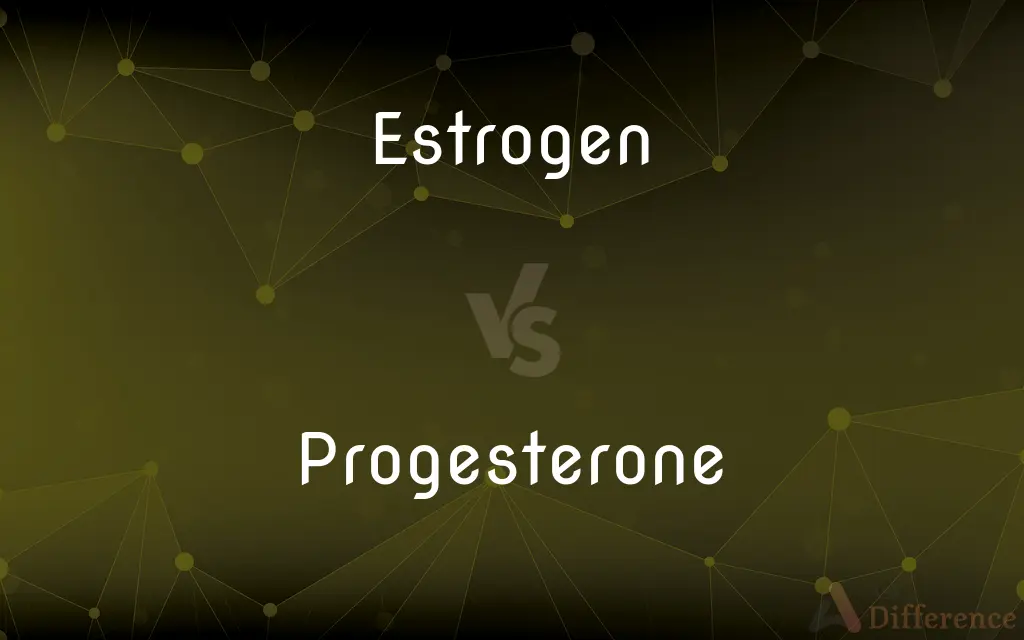Estrogen vs. Progesterone — What's the Difference?
Edited by Tayyaba Rehman — By Fiza Rafique — Updated on September 25, 2023
Estrogen and progesterone are both female hormones. Estrogen regulates menstruation and fertility, while progesterone prepares and maintains the uterus for pregnancy. Their balance is vital for reproductive health.

Difference Between Estrogen and Progesterone
Table of Contents
ADVERTISEMENT
Key Differences
Estrogen and progesterone play critical roles in a woman's reproductive system, but they serve different primary functions. Estrogen, with its derivatives estradiol, estrone, and estriol, is predominantly responsible for developing and regulating the female reproductive system. It's involved in the regulation of the menstrual cycle and the development of secondary sexual characteristics during puberty. Progesterone, on the other hand, chiefly focuses on preparing the body for pregnancy after ovulation and sustaining the uterus throughout pregnancy.
Estrogen levels generally fluctuate throughout the menstrual cycle. They surge before ovulation, promoting the maturation of the ovarian follicles. This hormone also aids in maintaining bone density and regulating cholesterol levels in the body. Progesterone, contrastingly, sees its peak after ovulation. It helps to thicken the lining of the uterus, making it receptive to a fertilized egg.
In terms of synthesis, estrogen is primarily produced in the ovaries but also in the adrenal glands and fat tissues. It's vital for sexual development, especially during the teenage years. Progesterone is mainly secreted by the corpus luteum in the ovary and, in larger amounts, by the placenta during pregnancy. Its main task is ensuring the lining of the uterus is suitable for a fertilized egg.
Comparison Chart
Primary Role
Regulates menstruation and fertility.
Prepares and maintains uterus for pregnancy.
Production Site
Ovaries, adrenal glands, fat tissues.
Mainly ovaries and placenta during pregnancy.
ADVERTISEMENT
Cycle Fluctuations
Peaks before ovulation.
Peaks after ovulation.
Bone Health Influence
Helps in maintaining bone density.
Lesser role in bone health than estrogen.
Presence in Therapies
Often in hormonal therapies and contraceptives.
Commonly in hormonal therapies, especially post-menopausal.
Compare with Definitions
Estrogen
A regulator of the menstrual cycle.
Imbalances in estrogen can disrupt regular menstruation.
Progesterone
Produced by the corpus luteum post-ovulation.
After ovulation, the corpus luteum releases progesterone.
Estrogen
An influencer of bone, heart, and brain health.
Adequate estrogen levels help maintain good bone density.
Progesterone
A hormone vital for maintaining pregnancy.
Progesterone supports the uterine lining for a fertilized egg to implant.
Estrogen
A steroid hormone found in both genders but higher in females.
While males have estrogen, its concentration is much lower than in females.
Progesterone
A primary hormone in the menstrual cycle.
High progesterone levels indicate the luteal phase of the menstrual cycle.
Estrogen
A primary female sex hormone.
Estrogen levels rise during the first half of the menstrual cycle.
Progesterone
A steroid hormone with key roles in the reproductive system.
Progesterone therapy can be used to address menstrual irregularities.
Estrogen
A hormone responsible for female secondary sexual characteristics.
At puberty, increasing estrogen levels lead to breast development.
Progesterone
Essential for the development of the placenta and fetus.
During pregnancy, progesterone helps nourish the developing fetus.
Estrogen
Estrogen or oestrogen, is a category of sex hormone responsible for the development and regulation of the female reproductive system and secondary sex characteristics. There are three major endogenous estrogens that have estrogenic hormonal activity: estrone (E1), estradiol (E2), and estriol (E3).
Progesterone
Progesterone (P4) is an endogenous steroid and progestogen sex hormone involved in the menstrual cycle, pregnancy, and embryogenesis of humans and other species. It belongs to a group of steroid hormones called the progestogens and is the major progestogen in the body.
Estrogen
Any of several steroid hormones, such as estradiol and estrone, that are produced primarily by the ovaries, stimulate the development and maintenance of female secondary sex characteristics, exert systemic effects such as the growth and maturation of long bones, and promote estrus in many female mammals. Estrogens synthesized from plant sources or obtained from horses are used as drugs, primarily to treat estrogen deficiency.
Progesterone
A steroid hormone released by the corpus luteum that stimulates the uterus to prepare for pregnancy.
Estrogen
Any of several synthetic compounds that mimic the physiologic activity of estrogen, such as ethinyl estradiol, used primarily in oral contraceptives.
Progesterone
A steroid hormone, C21H30O2, that is secreted by the corpus luteum of the ovary and by the placenta and that acts to prepare the uterus for implantation of the fertilized ovum and to maintain pregnancy.
Estrogen
(steroid hormone) Any of a group of steroids that are secreted by the ovaries and function as female sex hormones.
Progesterone
This compound formulated as a drug, usually prepared synthetically from phytosterols, used in the treatment of infertility, amenorrhea, abnormal uterine bleeding, and certain other conditions.
Estrogen
A general term for female steroid sex hormones that are secreted by the ovary and responsible for typical female sexual characteristics
Progesterone
A steroid hormone, secreted by the ovaries, whose function is to prepare the uterus for the implantation of a fertilized ovum and to maintain pregnancy.
Progesterone
A synthetic version of the compound, used in contraceptive pills and other pharmaceutical products.
Progesterone
A steroid hormone (trade name Lipo-Lutin) produced in the ovary; prepares and maintains the uterus for pregnancy
Common Curiosities
Can menopause affect estrogen levels?
Yes, estrogen levels typically decline during and after menopause.
How does progesterone support pregnancy?
Progesterone prepares and maintains the uterus for a fertilized egg.
Can imbalances in estrogen lead to health issues?
Yes, imbalances can cause menstrual disruptions, bone density loss, and other issues.
What's the main role of estrogen in women?
Estrogen regulates menstruation and fertility.
Why is progesterone essential during pregnancy?
It ensures the uterus lining is suitable for the embryo and supports the placenta and fetus.
Do both hormones influence bone health?
Estrogen plays a major role in maintaining bone density, while progesterone has a lesser influence.
Are males completely devoid of estrogen?
No, males have estrogen but in much lower levels than females.
What's the relation between progesterone and the menstrual cycle?
Progesterone prepares the uterus lining post-ovulation for potential pregnancy.
Are synthetic forms of these hormones used in medicine?
Yes, both are used in hormonal therapies, including contraceptives.
What's the relationship between estrogen and breast development?
Estrogen is crucial for the development of breasts during puberty.
When are progesterone levels the highest in women?
They peak after ovulation and during pregnancy.
Can imbalances in progesterone cause infertility?
Yes, as it's vital for preparing the uterus for a fertilized egg.
How does progesterone affect mood?
Some women may experience mood changes due to fluctuating progesterone levels.
Can progesterone levels be checked with tests?
Yes, blood tests can measure progesterone, especially to confirm ovulation or check pregnancy health.
Are there health risks associated with high estrogen levels?
Yes, elevated estrogen can be linked to certain cancers, thrombosis, and other conditions.
Share Your Discovery

Previous Comparison
Paper vs. Page
Next Comparison
Octad vs. OctetAuthor Spotlight
Written by
Fiza RafiqueFiza Rafique is a skilled content writer at AskDifference.com, where she meticulously refines and enhances written pieces. Drawing from her vast editorial expertise, Fiza ensures clarity, accuracy, and precision in every article. Passionate about language, she continually seeks to elevate the quality of content for readers worldwide.
Edited by
Tayyaba RehmanTayyaba Rehman is a distinguished writer, currently serving as a primary contributor to askdifference.com. As a researcher in semantics and etymology, Tayyaba's passion for the complexity of languages and their distinctions has found a perfect home on the platform. Tayyaba delves into the intricacies of language, distinguishing between commonly confused words and phrases, thereby providing clarity for readers worldwide.
















































